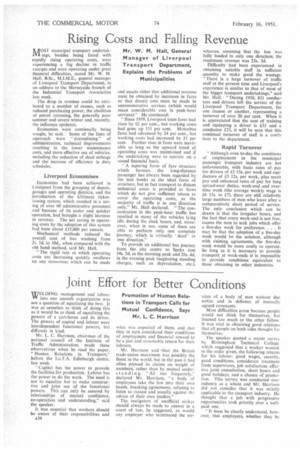Rising Costs and Falling Revenue
Page 52

If you've noticed an error in this article please click here to report it so we can fix it.
Mr. W. M. Hall, General Manager of Liverpool Transport Department, Explains the Problems of Municipalities
1. AOST municipal transport undertakLVI ings, besides being faced with rapidly rising operating costs, were experiencing a big decline in traffic receipts and were operating under great financial difficulties, stated Mr. W. M. Hall, B.Sc., M.I.M.E., general manager of Liverpool Transport Department, in an address to the Merseyside branch of the Industrial Transport Association last week.
The drop in revenue could be attributed to a number of causes, such as reduced purchasing power, the abolition of petrol rationing, the generally poor summer and severe winter and, recently, the influenza epidemic.
Economies were continually being sought, he said. Some of the lines of approach were "streamlining" of administration, technical fraprovements resulting in the lower maintenance costs, and more effective use of vehicles. including the reduction of dead mileage and the increase of efficiency in duty schedules.
• Liverpool Economises :Economies had been achieved in Liverpool from the grouping of depots, garages and operating districts, and the introduction of the Ultimate ticketissuing system, which resulted in a saving of over 60 administrative personnel and because of its easier and quicker operation, had brought a slight increase in revenue. The net saving in operating costs by the adoption of this system had been about £15,000 per annum. Mechanical methods reduced the overall cost of bus washing from 2s. Id. to 10d., when compared with the old hand method, said Mr. Hall. The rapid rate at which operating costs are increasing quickly swallows up any economies which can be made and means either that additional revenue must be obtained by increases in fares or that drastic cuts must be made in unremunerative services (which would mean considerable cuts in peak-hour services)." He continued:
" Since 1939, Liverpool tram fares had risen by 62 per cent., but working costs had gone up 131 per cent. Motorbus fares had advanced by 24 per cent., but working costs had increased by 51 per cent. Further rises in fares were inevitable so long as the upward trend of operating costs was maintained and if the undertaking were to operate on a sound financial basis.
" A tapering form of fare strut:Lute which favours the long-distance passenger has always been regarded by the text books as the ideal form of structure, but in fact transport to distant industrial areas is provided at fares which do not give sufficient return to cover the operating costs, as the majority of traffic is in one direction only," Mr. Hall declared. "The concentration in the peak-hour traffic has resulted in many of the vehicles lying idle during the slack hours, and, moreover, when in use, some of them are able to perform only one complete journey, which is virtually ' dead ' in one direction."
To provide an additional bus journey from the city centre to Speke cost 34s. 2d. in the morning peak and 26s. 4d. in the evening peak (neglecting standing charges, such as depreciation, etc.), whereas, assuming that the bus was fully loaded in only one direction, the maximum revenue was 25s. 5d.
Difficulty had been experienced in obtaining suitable staff in sufficient quantity to make good the wastage. " There is a large turnover of traffic staff at the •present time and Liverpool's experience is similar to that of most of the bigger transport undertakings," said Mr. Hall. "During 1950, 831 conductors and drivers left the service of the Liverpool Transport Department, for one reason or another, representing a turnover of over 20 per cent. When it is appreciated that the cost of training and equipping a driver is £31 and a conductor £23, it will be seen that this continual turnover of staff is a costly item to the department.
Rapid Turnover "Although even to-day the conditions of employment in the municipal passenger transport industry are not unfavourable, with basic rates of pay for drivers of £5 15s, per week and conductors of £5 12s. per week, plus merit pay and enhanced rates of pay for long spread-over duties, week-end and overtime work .(the average weekly wage is £6 15s. to £7), there are still relatively large numbers of men who leave after a comparatively short period of service. The only conclusion which can be drawn is that the irregular hours, and the fact that every week-end is not free, causes the men to seek jobs which offer a five-day week for preference. . . . It may be that the adoption of a five-day week would be the solution, although with existing agreements, the five-day week would be more costly to operate. So long as it is necessary to provide transport at week-ends it is impossible to provide conditions equivalent to those obtaining in other industries.




















































































